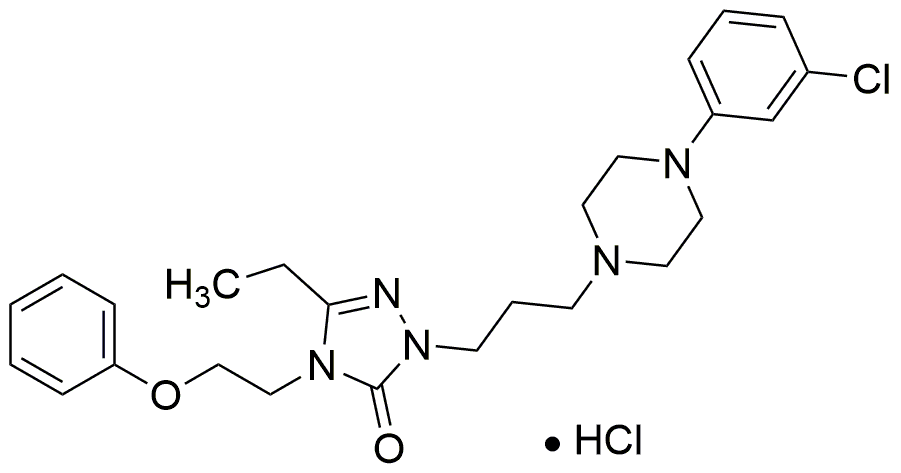Nefazodone hydrochloride is widely utilized in research focused on:
- Antidepressant Therapy: Commonly prescribed for treating major depressive disorder, it helps improve mood and alleviate anxiety, offering an alternative to traditional SSRIs with a different side effect profile.
- Psychiatric Research: Used in clinical studies to understand its effects on serotonin and norepinephrine levels, aiding researchers in developing new mental health treatments.
- Pharmacological Studies: Investigated for its interactions with various neurotransmitter systems, providing insights into drug mechanisms and potential new therapeutic targets.
- Combination Therapy: Explored in conjunction with other medications to enhance treatment efficacy for patients who do not respond to standard therapies, showcasing its versatility.
- Patient Compliance: Its relatively favorable side effect profile compared to other antidepressants may lead to better adherence among patients, addressing a common challenge in mental health treatment.
General Information
Properties
Safety and Regulations
Applications
Nefazodone hydrochloride is widely utilized in research focused on:
- Antidepressant Therapy: Commonly prescribed for treating major depressive disorder, it helps improve mood and alleviate anxiety, offering an alternative to traditional SSRIs with a different side effect profile.
- Psychiatric Research: Used in clinical studies to understand its effects on serotonin and norepinephrine levels, aiding researchers in developing new mental health treatments.
- Pharmacological Studies: Investigated for its interactions with various neurotransmitter systems, providing insights into drug mechanisms and potential new therapeutic targets.
- Combination Therapy: Explored in conjunction with other medications to enhance treatment efficacy for patients who do not respond to standard therapies, showcasing its versatility.
- Patient Compliance: Its relatively favorable side effect profile compared to other antidepressants may lead to better adherence among patients, addressing a common challenge in mental health treatment.
Documents
Safety Data Sheets (SDS)
The SDS provides comprehensive safety information on handling, storage, and disposal of the product.
Product Specification (PS)
The PS provides a comprehensive breakdown of the product’s properties, including chemical composition, physical state, purity, and storage requirements. It also details acceptable quality ranges and the product's intended applications.
Certificates of Analysis (COA)
Search for Certificates of Analysis (COA) by entering the products Lot Number. Lot and Batch Numbers can be found on a product’s label following the words ‘Lot’ or ‘Batch’.
Numéro de catalogue
Numéro de lot/série
Certificates Of Origin (COO)
This COO confirms the country where the product was manufactured, and also details the materials and components used in it and whether it is derived from natural, synthetic, or other specific sources. This certificate may be required for customs, trade, and regulatory compliance.
Numéro de catalogue
Numéro de lot/série
Safety Data Sheets (SDS)
The SDS provides comprehensive safety information on handling, storage, and disposal of the product.
DownloadProduct Specification (PS)
The PS provides a comprehensive breakdown of the product’s properties, including chemical composition, physical state, purity, and storage requirements. It also details acceptable quality ranges and the product's intended applications.
DownloadCertificates of Analysis (COA)
Search for Certificates of Analysis (COA) by entering the products Lot Number. Lot and Batch Numbers can be found on a product’s label following the words ‘Lot’ or ‘Batch’.
Numéro de catalogue
Numéro de lot/série
Certificates Of Origin (COO)
This COO confirms the country where the product was manufactured, and also details the materials and components used in it and whether it is derived from natural, synthetic, or other specific sources. This certificate may be required for customs, trade, and regulatory compliance.


